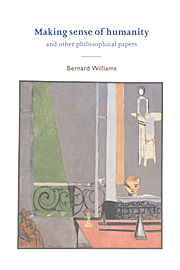Book contents
- Frontmatter
- Contents
- Preface
- I Action, freedom, responsibility
- II Philosophy, evolution, and the human sciences
- III Ethics
- 13 The point of view of the universe: Sidgwick and the ambitions of ethics
- 14 Ethics and the fabric of the world
- 15 What does intuitionism imply?
- 16 Professional morality and its dispositions
- 17 Who needs ethical knowledge?
- 18 Which slopes are slippery?
- 19 Resenting one's own existence
- 20 Must a concern for the environment be centred on human beings?
- 21 Moral luck: a postscript
- Index
14 - Ethics and the fabric of the world
Published online by Cambridge University Press: 28 January 2010
- Frontmatter
- Contents
- Preface
- I Action, freedom, responsibility
- II Philosophy, evolution, and the human sciences
- III Ethics
- 13 The point of view of the universe: Sidgwick and the ambitions of ethics
- 14 Ethics and the fabric of the world
- 15 What does intuitionism imply?
- 16 Professional morality and its dispositions
- 17 Who needs ethical knowledge?
- 18 Which slopes are slippery?
- 19 Resenting one's own existence
- 20 Must a concern for the environment be centred on human beings?
- 21 Moral luck: a postscript
- Index
Summary
John Mackie held that values, in particular ethical values, were not objective, a denial which he took to mean that they were not ‘part of the fabric of the world’ (p. 15). He stressed that this was to be taken as an ontological thesis, as opposed to a ‘linguistic or conceptual’ thesis, and to arrive at it was, for him, a matter of ‘factual rather than conceptual analysis’ (p. 19). In this respect, he found a parallel between value properties and secondary qualities, as he did more generally, being prepared to say of both that they were ‘projected’ on to the world. The idea of ‘factual analysis’, and the exact contrast that he intended with conceptual analysis, are not entirely clear, and I suspect that he put it in this way because he closely associated the conceptual and the linguistic, and he wanted to stress – rightly – that the truth of what he claimed was not going to be determined by an enquiry into the use of ethical words. In any sense broader than that, it seems reasonable to hold, as McGinn has argued, that the question of the subjectivity of secondary qualities is a conceptual question; and if that is, so will the same question with respect to ethical qualities (as I shall, for the moment, vaguely call them).
Mackie's own arguments for his conclusion make it unclear how this could be a factual issue. One, the so-called ‘argument from queerness’, says in effect that the idea of ontologically objective values explains nothing and offends against parsimony: and the grounds of this criticism seem to be entirely a priori.
- Type
- Chapter
- Information
- Making Sense of HumanityAnd Other Philosophical Papers 1982–1993, pp. 172 - 181Publisher: Cambridge University PressPrint publication year: 1995
- 7
- Cited by



